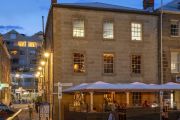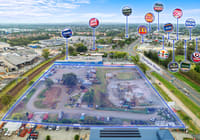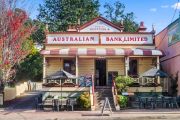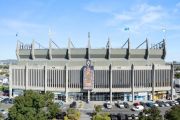
The $3m CBD winery opening in a building where AA meets
Melbourne’s first CBD winery will open next month in an unusual location – on the ground floor of a building where AA meetings take place upstairs.
Barman & Larder hospitality group boss Eddie Muto, whose other ventures include Mercato Centrale on Collins Street, Left Bank in the city’s Southbank, and Flour Child in St Kilda, said he negotiated his lease with the charity owning the Ross House Building five years ago.

“It took me a long time to convince them that we could work together,” Muto told The Australian Financial Review. “They wanted to see that we were more food-focused.”
There is food, but wine is the focus of Muto’s new operation covering 660 square metres on the ground floor at 247 Flinders Lane.
The front door opens onto a 150-square-metre cellar door offering, with a restaurant area behind, where patrons will choose their wine first and then be offered items from the menu to match the drink they’ve chosen, in what he called a “wine forward” approach.
Muto, who has taken a 26-year lease for the venue he’ll open in mid-April, says it is a bet on the promise that consumer spending in the city centre, battered first by COVID-19 lockdowns and then by the cost-of-living crisis, will pick up.
“It has definitely not improved,” he said. “When people start to work back in the office it will make a huge difference.”
It’s been a $3 million investment to prepare the ground floor of the only remaining building in Melbourne designed by Sydney architect Sir John Sulman – after whom the country’s most prestigious award for public architecture is named.

The capital has gone into putting in the necessary power infrastructure, a commercial kitchen with $30,000 Rinaldi superforni pizza oven, spaces such as a cheese counter and oyster bar, and upgrading airconditioning in a building built in 1899 as a warehouse.
Partitions of barrels and movable curtains will allow the restaurant to be broken up into smaller and larger dining areas. A staircase leads to a raised private dining room at the Flinders Lane front end of the restaurant.
Muto said he negotiated the lease agreement five years ago with the Ross House Association, the charity that owns the five-storey, heritage-listed building previously known as Royston House.
He declined to reveal the rental price, struck in the first year of the pandemic, but said it was more beneficial to his business than the landlord.
“I think we’ve come out better,” Muto said.
The association, which made $713,000 of its $1 million revenue last year from lease income, bills itself the only self-managed and community-owned not-for-profit building in Melbourne. It offers meeting and office space to organisations with a social purpose, including Alcoholics Anonymous.
Meeting hours listed on AA’s own website indicate they are held early in the day, before the winery opens.
Ross House Association did not respond to email and phone messages requesting comment.
While the venue bills itself as a working winery – it will have a section with a basket press and guests can take part in activities such as crushing grapes – wine served under Melbourne Winery’s own label will be made and bottled by Peter Riley’s Scotchmans Hill winery on the Bellarine Peninsula.
Corporate business – such as functions and team-building events – will likely account for up to half of Melbourne Winery’s revenue, Muto said.
It will have its own-label wines including sauvignon blanc, chardonnay, tempranillo, sangiovese and shiraz, all sourced from different vineyards and produced in small batches of as little as 50 to 60 cases, Muto said.
He said the contradiction posed by having a wine bar in the same building as AA meetings was no greater than that of any other venue on Flinders Lane, including the licensed cafe across the road.
“There is temptation by going to Brunetti,” Muto said.











